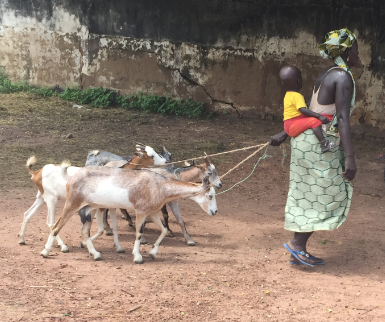
Advancing women’s participation in livestock vaccine value chains in Nepal, Senegal, and Uganda
2020-2022
Principal investigators at UF: Dr. Sandra Russo, Director of the Office for Global Research Engagement (UFIC), Dr. Sarah McKune (DEGH) and Dr. Renata Serra (African Studies)
Objective
The Leveraging Intersectionality in livestock Vaccine value chains for gender Transformation in Nepal, Senegal, and Uganda (LIVT) project will examine gendered roles and relations in selected vaccine distribution chains for diseases that affect women-owned or managed small ruminants and poultry in Nepal, Senegal, and Uganda. The aim of the project is to increase livestock vaccination uptake by women, using a gendered intersectional transformative approach (GITA). The GITA not only takes gender into consideration but also considers other factors, such as age, race, caste, ethnicity, religion, and livelihood.
Dr. Sarah McKune and Dr. Renata Serra are responsible for the project in Senegal, where they work in close collaboration with Dr. Alioune Touré, who is the country project coordinator and head of the Department of Animal Health at the University of Sine-Saloum El Hadji Ibrahima Niasse (USSEIN) in Kaffrine.
The faculty team has directed fieldwork with the help of graduate students from the universities of Florida (UF), Cheikh Anta Diop (UCAD) in Dakar and Sine-Saloum El Hadji Ibrahima Niasse (USSEIN) in Kaffrine. Data collection started in Summer-Fall 2019 when the team conducted a gender and intersectional mapping of small ruminant and poultry vaccine value chains in the region of Kaffrine.
In February 2020, the team initiated a baseline data collection on women’s empowerment in livestock, which was interrupted due to COVID-19 and started again in February 2021. These and other data – some of which were collected through phone interviews of animal health providers in Kaffrine during the fall of 2020 – are to inform the planned intervention strategy, which consists of a series of training of local instructors.
The project seeks to empower actors within the livestock system, from the regional animal health providers down to the communities. It emphasizes the influence of gender and intersectionality on health provision, and aims to enhance communication skills, conflict resolution and business solutions to make the work of these actors more impactful.
The intervention, scheduled to start in the summer 2021 (COVID permitting), will ultimately contribute to a multi-country analysis to assess the impacts and barriers of gender and intersectionality on women’s entry and effective participation in the vaccine distribution chain.
Funding
The University of Florida International Center was awarded a $1.177 million research grant by Canada’s International Development Research Centre (IDRC). The funding comes through the Livestock Vaccine Innovation Fund, which is supported by the Bill & Melinda Gates Foundation, Global Affairs Canada, and IDRC.
Social media
Follow this project on LinkedIn.